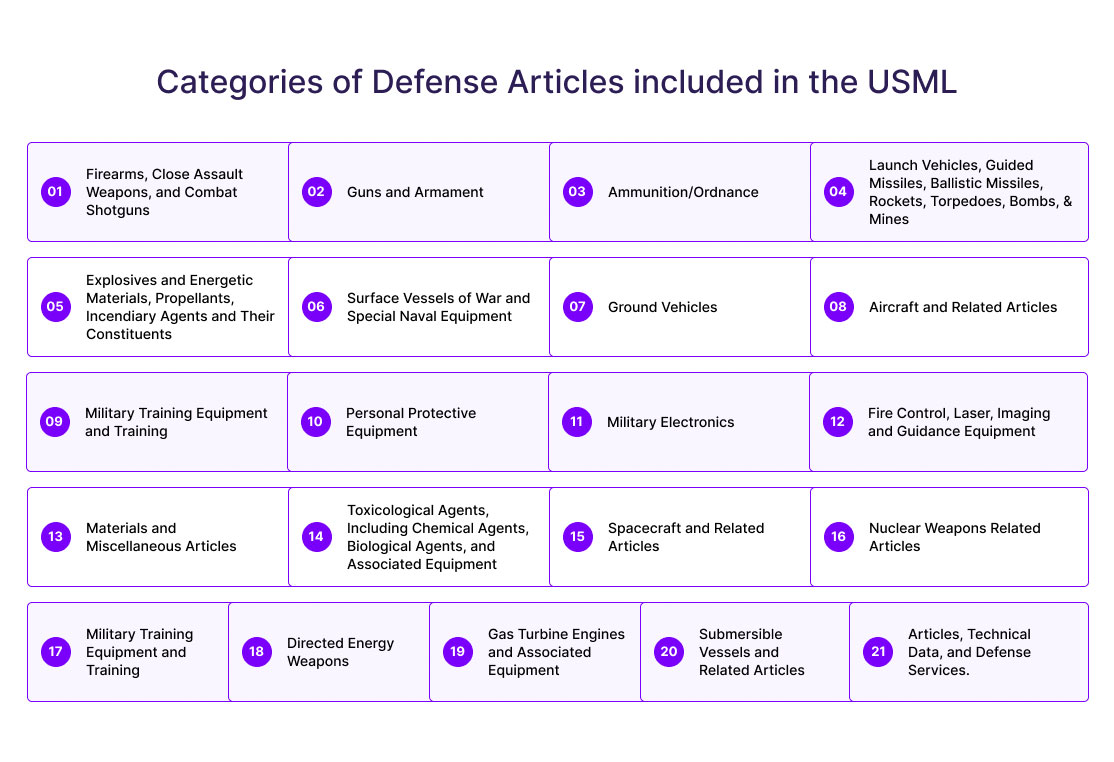Videos & Webinars
Watch videos featuring supply chain experts
The US authorities closely monitor and regulate their exports. With multiple laws and regulations in place, the government enables trade agreements, sanctions, embargoes, etc. in order to control trading activities with our countries. ITAR regulation is one such crucial US export control framework.
In this article, we are going to explain everything about ITAR that any US business/individual must know before starting to export.
ITAR meaning International Traffic in Arms Regulations denotes a set of laws and regulations imposed by the US authorities to regulate and monitor the export of all defense items, technologies, and services.
Essentially, ITAR regulations are imposed by US agencies to prevent unlawful trading activities between US companies/individuals and sanctioned entities/countries of any defense-related article. The aim is to safeguard the nation’s economic interests, human rights, and anti-terrorism policies.
International Traffic in Arms Regulations is a part of the larger export regulatory framework of the US government. It enacts the Arms Export Control Act (AECA) through which the US government controls the designation of items or related services for military purposes. Such designated items are further defined in the United States Munition List or USML.
The body responsible for maintaining ITAR is DDTC or Directorate of Defense Trade Controls, US State Department. However, there are more agencies involved in ITAR compliance for different activities:
There are 11 parts in the ITAR framework which are as follows:
The structure of ITAR is such that allows greater control and flexibility to the government regarding the extension of the ITAR legislation over different articles. This imparts greater authority to the US government towards protecting national security and executing anti-terrorism policies.
Essentially, ITAR covers the following organizations and entities:
As mentioned above, the articles defined by Arms Export Control Act for defense purposes are constituted under the USML or United States Munitions List which is an ITAR list. The articles included in USML are selected on the basis of:

Beginning with this, a company/individual dealing with ITAR-controlled goods in any way must be registered with the DDTC. One can follow the related guidelines on DDTC’s official website. Moreover, one must thoroughly check the complete ITAR requirements as well as the US Munitions List to ensure that the items are subjected to the controls.
The Directorate of Defense Trade Controls recently amended the ITAR to incorporate changes that clarify and organize the regulations even better. As more changes are underway, companies must ensure awareness and timely compliance with the new requirements.
What makes ITAR compliance challenging is the details of the regulatory framework. Most entities are not aware of the extent of ITAR controls over different items. You can check the regulatory websites manually and go through long lists for ensuring compliance with ITAR norms. Or, there are solutions that can do all this for you in a single click.
Trademo Compliance provides you with a detailed view of all the import/export compliance norms you need to meet.
The US government expects exporting entities to be strictly compliant with the ITAR regulations. To ensure that, there are severe consequences put in place which are as follows:
Yes. An ITAR exemption is a set of requirements a shipment needs to meet for being exempted from ITAR controls. Such goods no longer need an export license. These exemptions are only allowed by the US government after a thorough evaluation of the concerned shipment and concluding that it can be exported safely without any threat to national security.
Here are a few articles on which ITAR exemptions are usually applicable:
ITAR exemptions are also extended for certain ally countries by the US government:
Companies must not assume about these exemptions, for example, just shipping to Canada does not mean that you are eligible for exemption under the concerned law. It is crucial to ensure complete qualification for the exemption by checking if the conditions are being met.
After DDTC registration and assessing all the requirements, exporters can apply for an exemption. This can be done on the Electronic Export Information portal. After that, the shipment can move forward without any export license but as per the guidelines of the authorities for exempted goods.
However, you must be very careful with ITAR exemptions and pay attention to every close detail while applying for them. There should be no loose claim.
ITAR regulations can be confusing as well as challenging but it is crucial owing to different legal reasons. ITAR compliance is not just registering with the concerned authorities, submitting forms, and paying the fee. It’s a continuing process of managing a full compliance program including meeting all requirements, implementing a compliance strategy, training employees, executing the program on a daily basis, and updating it as required.
You must not risk an ITAR violation but ensuring compliance manually can be a hectic task. Let Trademo Compliance help you determine the applicability of ITAR controls to your goods in a few simple steps.
LEARN MORE